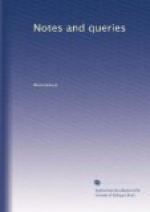“Cum Edwardus primus,” &c. &c.—Spelmanni Aspilogia, p. 132.
The Spaniards found that the swan had been employed emblematically in Mexico, supporting the theory of Hornius that that part of America was colonised by the Phoenicians and Carthaginians, inasmuch as, according to Bryant, “where the Canaanites or their descendants may have settled, there will a story be found in reference to swans.”
The mythological history of the Cygnus will be found in the latter author’s Analysis, and in Hill’s Urania, or a Complete View of the Heavens, containing the Ancient and Modern Astronomy, in Form of a Dictionary, which will perhaps meet the wants of G.I.C. (Vol. iii. p. 24.).
It will not, perhaps, be irrelevant to this subject to advert to the story of Albertus Aquensis (in Gesta Dei per Francos, p. 196.), regarding a Goose and a Goat, which in the second crusade were considered as “divino spiritu afflati,” and made “duces viae in Jerusalem.” Well may it be mentioned by the histoian as “scelus omnibus fidelibus incredibile;” but the imputation serves to show that the Christians of that age forgot what a heathen poet could have taught them,—
[Greek: “Eis oionos aristos amynesthai peri patres.”]
T.J.
[Footnote 9: With this solecism in the printed Flores Historiarum I find that a MS. in the Chetham Library agrees, the abbreviative mark used in the Hundred Rolls of Edward I. for the terminations us and er having been affixed to this participle.]
[Footnote 10: To the passages I have elsewhere referred to on The Concert of Nature, from Ausonius, Epistle 25., and Spenser’s Faerie Queen, book ii. canto xii. st. 71., “divine respondence meet” is made by the last lines in Tennyson’s Dying Swan.]
Swearing by Swans (Vol. ii., p. 392.).—The quotation given by your correspondent E.T.M. (Vol. ii., p. 451.), only increases my desire to receive a reply to my query on this subject, since he has adduced a parallel custom. What are the earliest notices of the usage of swearing by swans and pheasants? Was the pheasant ever considered a royal bird?
R.V.
The Frozen Horn (Vol. iii., p. 25.).—I am quite angry with J.M.G. for supposing my old friend Sir John Maundevile guilty of such a flam as that which he quotes from memory as the worthy knight’s own statement. There is no such story in the Voiage and Travaile: nay more, there is not in the whole of that “ryght merveillous” book, a single passage given on the authority of Sir John as eyewitness that is not perfectly credible. When he quotes Pliny for monsters, the Chronicles for legends, and the romances of his time for narratives of an extraordinary character, he does so in evident good faith as a compiler. His most improbable statements, too, are always qualified with some such phrase as “men seyn, but I have not sene it.” In a word, I believe Sir John Maundevile to have been as truthful in intention as any writer of his age. I am afraid that J.M.G.’s knowledge of our old “voiager” is limited to some jest-book of more modern times, which attributes to him sayings and doings of which he is perfectly guiltless.




